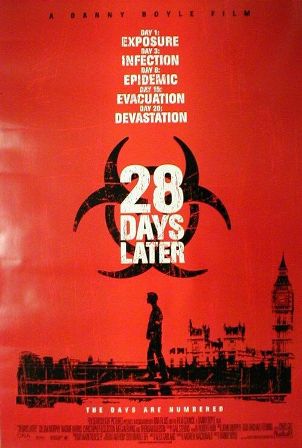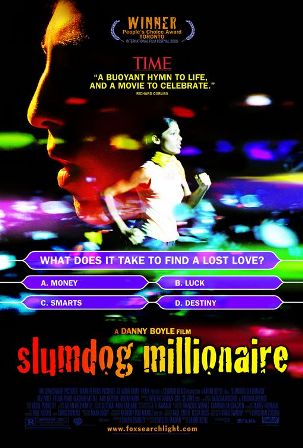CHICAGO – Patrick McDonald of HollywoodChicago.com appears on “The Morning Mess” with Dan Baker on WBGR-FM (Monroe, Wisconsin) on March 21st, 2024, reviewing the new streaming series “Manhunt” – based on the bestseller by James L. Swanson – currently streaming on Apple TV+.
Feature: The Top 9 Films of Director Danny Boyle
6. “28 Days Later” (2002)

Over the past decade, many of the best zombie flicks have been in the form of tongue-in-cheek satires, from “Shaun of the Dead” to “Zombieland.” The genre has literally been done to death, but “28 Days Later” revitalized it by plunging the audience headfirst into the characters’ visceral horror and unease. In the film’s mesmerizing opening sequence, Jim (Cillian Murphy) wanders through the desolate landscape of post-apocalyptic London. The silence and emptiness in that sequence is as chilling as any of the scares to come. While Boyle made the odd choice of blurring the frame around his villain in “Sunshine,” rendering much of the climactic action borderline incomprehensible, the director’s approach to lensing the zombies (referred to by characters as “the infected”) in “28 Days” was a masterstroke. With the assistance of cinematographer Anthony Dod Mantle, Boyle utilized the slow-motion capabilities of his Canon DV cameras, resulting in sequences where every third or fourth frame of film appears to be cut, thus increasing the ferocious speed of the infected. There are several jump-worthy moments made all the more effective by the genuinely compelling characters. This film launched the career of Murphy, whose glassy eyes and angular face are utterly magnetic. It also offered a terrific showcase for Naomie Harris, whose character is such a hardened survivor that she brutally kills one of her longtime companions the instant he becomes infected, since the transformation from human to zombie occurs only in a matter of seconds. This leads to moments of surprising emotional power as the characters grapple with their fragile mortality, while connecting through their shared humanity. Brendan Gleeson is especially memorable as a kindly father who befriends Murphy on his quest for safety. Unfortunately, the film’s multiple alternate endings illustrate that Boyle was deeply uncertain about how to end this story. His penchant for happy endings (similar to that of Spielberg) led him to tack an abruptly artificial one onto the film’s theatrical cut.
5. “Shallow Grave” (1994)

Taking a cue from the Coen Brothers’ “Blood Simple,” Boyle’s directorial debut is a gleefully deranged, superbly executed thriller about the corrosive nature of greed, and the effect it has on three friends united by their shared arrogance. Boyle’s distinctive style is assured right from the get-go, setting the standard for all the films that followed. It opens with a monologue delivered quickly and confidently by its main character, jettisoning viewers into the story with the speed of a freight train. The premise is deceptively simple: flat mates (played by relative newcomers Ewan McGregor, Christopher Eccleston and Kerry Fox) welcome a new tenant. It’s not long before they discover him dead next to a pile of money. So what do the opportunistic twerps do? Keep the cash and bury the body. Pity they didn’t bury it deep enough. Part of the film’s pleasure is generated simply by watching despicable people getting their just desserts. There’s a delicious moment when journalist McGregor is assigned to cover his own crime. Yet the film is largely anchored by Eccleston, as his character becomes increasingly unhinged, lurking in the attic while spying on his mates through drilled peepholes in the floor. As in Boyle’s equally revelatory sophomore effort, “Trainspotting,” this film explores a particular type of friendship linked by self-interest motives and crippling obsession that ultimately negate any semblance of trust or kinship. And Boyle fans are advised to be on the lookout for an eerie baby doll that foreshadows a similarly demonic infant destined to haunt McGregor in a future picture…
4. “Slumdog Millionaire” (2008)

The most phenomenal critical and financial success of Boyle’s career still manages to hold up in the aftermath of its hype. Though it has gained the reputation of an unabashed crowd-pleaser, it’s easy to forget just how dark and rough-edged the film is, as it follows Indian street child Jamal as he comes of age in Mumbai, a land where poverty and prosperity seem to have coexisted since the beginning of time. The duality of the film’s vibrant location sets the mood for the film, which mixes documentary realism and escapist flights of fancy with infinitely greater success than Boyle’s similarly themed “Life Less Ordinary.” “Slumdog” also shares that previous film’s theme of fate, and how it paves the way for triumph. It’s clear that love stories are not one of Boyle’s strong suits, since the romantic relationships in his films are often contrived or underdeveloped. In the case of “Slumdog,” audiences have the choice to either resist the epic romance between Jamal and the girl of his dreams, Latika, or simply buy into its shameless sentimentality. Their faerie tale subplot may have been a bigger problem if the rest of the picture wasn’t so spellbinding. The script by Simon Beaufoy (“The Full Monty”), based on Vikas Swarup’s novel, “Q & A,” is ingeniously structured, centering on Jamal’s tumultuous journey that led him to become an unlikely contestant on “Who Wants to Be a Millionaire?” As Jamal answers each question correctly, the film races back in time to illustrate how he came to know the answer. Boyle coaxes remarkable performances out of the children (all non-actors) who portray the characters at various ages. In the pivotal role of teenage Jamal, Dev Patel (from the fabulous British show “Skins”) is as riveting as he is photogenic. Though the film’s jovial headlines about box office numbers and Academy Awards were quickly forgotten in the wake of the subsequent Mumbai massacre, “Slumdog” is a kinetically thrilling and truly noble use of the cinematic medium to instill hope in an audience that is direly in need of it. This is one piece of escapism that wholeheartedly earns its Bollywood ending.


